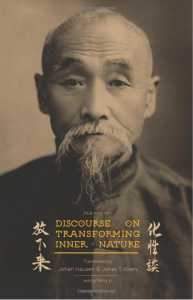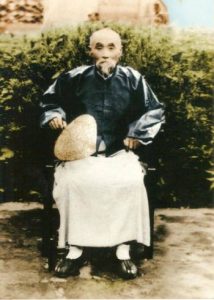Who Was Wang Feng Yi 王鳳儀?
(The following is an extract from the Prologue of “Discourse On Transforming Inner Nature: Hua Xing Tan” by Wang Fengyi, Translated by Johan Hausen and Jonas Akers)

“Wang Fengyi was born on November 1, 1864 in Wang Jia Yin Zi village, Chaoyang, Liaoning province, China…Due to poverty Wang Fengyi did not receive any formal education during his youth. Despite his benevolence, fate seemed to have been on bad terms with Wang Fengyi. He was unfortunate to suffer from a serious illness at the age of twenty-six, which made him bedridden and forced him to remain at home. He was diagnosed with abscesses in his stomach. Over five years, it progressively worsened and he escaped death by the skin of his teeth. He saw the local doctor in his search for a cure, but was not well-off enough to pay for the whole course of herbal medicines. Therefore he could only undergo half of the treatment course and was left struggling to do even light physical labour.
At age thirty-five he attained the Dao after having met a vagabond traveler and wise man named Yang Bai 楊柏 who gave an account of a simple moral tale:
Once there was a young boy who came back from school and refused to study. However, his stepmother forced him to do so. The boy was unhappy and lamented, ” If my mother was still alive, she would not have treated me like this, and I wouldn’t have to go through this suffering because of you!” As a result the stepmother was shocked and devastated. The old family servant stepped in a taught the boy and important lesson, “Your stepmother works hard day by day to provide for your life and pay you tuition fees since your father’s death, this is why you should not say mean words like that to her.” The little boy realised that he was out of place and that his emotions had gotten the better of him, and immediately said he was sorry. His stepmother awakened to her own shortcoming, since she had let it get to her so badly in the first place, and offered an apology as well.
Although this story seems quite simplistic and straightforward, it really shook up Wang Fengyi and exerted a powerful influence on him. According to his biography Records of Dutiful Behaviour, he suddenly gained a deeper understanding:
君子无德怨,小人有过怨他人
When noble people lack virtue they blame their own cultivation, whereas lowly people blame others for their own mistakes.
He possibly became aware of the repercussions and implications of emotions on his own health condition and this story served to open his eyes to it. He perhaps concluded that negative emotions could be eradicated and that there was no need to carry them around with him. After he completely recovered he was still judgemental of others, as he could not regard others as kind-hearted and good people. He became lofty and put himself above the contaminated and tainted world. As a result he decided to starve himself to death. On the fifth day of his attempt he had a near-death experience, as he shed the shell of his body, walking around being mindful and eventually returning to his physical body. He awoke to his gathered family members being utterly concerned about him. He grasped that death was not the answer, not would he be able to provide for his family after passing and, consequently, he accepted that good and bad are both part of this world and that it was his duty to look after his family.
Shortly after he let go of his judgemental attitude a local warlord seized his close friend, Yang Bai, because he had an argument with some racketeers. The government was collaborating with the gangsters. Wang Fengyi was scared for the life of his friend and was highly agonised for several days. Eventually he threw all caution overboard and made his way to jail, having found peace that he might have to pay the ultimate sacrifice of death. For a peasant and farmer like Wang Fengyi it posed a tremendous threat to defy the higher powers of the government authorities. It was around midnight when Wang Fengyi and his cousin closed in on the prison. All of a sudden the dark night turned as bright as if it were daytime, lasting for approximately twenty minutes. However only Wang Fengyi experienced this vision, while his cousin was unaware and oblivious to anything happening at this moment. Apparently Wang was instilled with prophetic powers foreseeing that his friend would not have to go through hardships for longer than three months. Yang Bai’s underlying karmic reasons for receiving his punish ment for three months was that he had mistreated his mother earlier in life. It could be speculated that Wang entered into a trance, as his mind completely emptied, fearless of life and death.
ment for three months was that he had mistreated his mother earlier in life. It could be speculated that Wang entered into a trance, as his mind completely emptied, fearless of life and death.
Later Wang Fengyi ventured out, travelling through different provinces and making a living as a venerated and renowned spiritual healer. Throughout his life he did not charge for his healing services, reflecting his practice of the Confucian virtue of benevolence. Wang piously followed the doctrine of Confucianism which emphasizes that a person should maintain benevolence not only outside the family but inside the family in order to foster and nurture good relationships amongst family members. In confucianism, the virtue of “Filial Piety” or ” Respect for one’s Parents” (xiao 孝) is given the greatest attention in family interactions. This is the reason why up to four generations used to live in one roof assisting the upbringing of the next generations.
After his father’s death Wang Fengyi committed himself to stay at his father’s graveside for three years. During that time he convinced his wife to enrol at the local school, as she was uneducated and illiterate. She was aged thirty-eight at that time and succeeded to take up in eventually taking up the profession of a school teacher. Education for children was not affordable for the majority of Chinese families as it was considered a luxury, let alone education for someone at such an advanced age and coming for a poor background. Wang Fengyi’s son followed in his mother’s footsteps and they both managed to become financially independent of Wang Fengyi. This in turn allowed Wang Fengyi to embark on his travels as he had fulfilled his family duties. Therefore one of his most remarkable accomplishments was the founding of countless schools ensuring the education of women, which was something rather unusual and a frowned upon undertaking at that time. He was involved in the setting up of around seven hundred schools for girls, a timeless and groundbreaking feat.
During his travels, he made speeches, told stories and helped numerous people to be healed from sickness. Wang Fengyi ascended at the age of seventy-four. When his coffin was returned to his hometown, he was received by large crowds of adherents paying homage to his last journey. On that day Wang Fengyi literally united the people from all walks of life and social strata as he has done during his lifetime in this world.”
